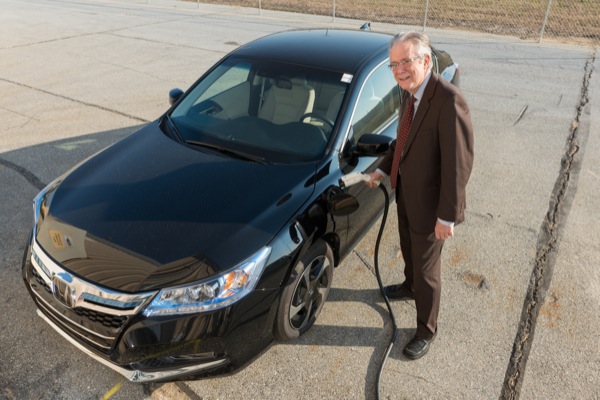
V2G partnership
UD, Honda partner on vehicle-to-grid technology
10:05 a.m., Dec. 5, 2013--Honda has joined a demonstration project for experimental vehicle-to-grid (V2G) technology aimed at providing a potentially valuable energy storage resource to the nation’s electrical grid while providing for more cost-effective ownership of plug-in electric vehicles.
The Honda technology builds off of the research conducted by the University of Delaware and now supported by NRG Energy Inc.
Research Stories
Chronic wounds
Prof. Heck's legacy
NRG and UD, through their V2G joint venture, came online early in 2013 with the world’s first revenue-generating vehicle-to-grid project, demonstrating the controls, regulatory requirements and market participation rules for selling energy storage from vehicles into the PJM Interconnection Regulation Market.
Honda is supplying an Accord Plug-In Hybrid with added V2G capabilities to the University’s Science, Technology and Advanced Research (STAR) Campus to jointly investigate the potential of this technology to benefit the electrical grid, vehicle owners and society.
“The participation of global automakers like Honda will help demonstrate and refine the technology,” said Willett Kempton, professor in UD’s College of Earth, Ocean, and Environment and research director of the University’s Center for Carbon-Free Power Integration. “The University of Delaware has been developing the technology so that vehicle batteries can be used not only for mobility but also for grid services. It is a big step toward a future with widespread availability of the technology to have Honda join our demonstration with their V2G-capable car.”
“This technology has the potential to support both a cleaner and more efficient power grid and a more positive ownership experience for EV customers,” said Steven Center, vice president of the Environmental Business Development Office of American Honda Motor Co. Inc. “With V2G technology, a network of PEVs (plug-in electric vehicles) becomes essentially a distributed energy storage system. It makes for an even stronger value equation for plug-in vehicles, with benefits for both the community and the vehicle user.”
Using smart grid technology, the V2G system is able to monitor the status of the grid to determine whether the grid requires additional power sources that can respond rapidly, or the grid requires power demands that can absorb transitional power supply.
Such a system has the potential to reduce or eliminate the fluctuation of the grid, which can occur more frequently when renewable energy sources are introduced to the grid. Electric vehicle owners potentially benefit from supporting a more stable power grid, which can lead to reduced utility costs for the vehicle owner.
“As the U.S. adds more intermittent resources to the grid, finding a lower cost energy storage technology that also benefits electric vehicle drivers is a great opportunity,” said Denise Wilson, NRG executive vice president and president, New Businesses. “We see this demonstration by Honda as an important step in the development of vehicle-to-grid technology.”
The demonstration is conducted in the area served by PJM Interconnection, which controls electricity supply in 13 states and the District of Columbia.
About UD’s College of Earth, Ocean, and Environment
UD’s College of Earth, Ocean, and Environment (CEOE) strives to reach a deeper understanding of the planet and improve stewardship of environmental resources. CEOE faculty and students examine complex information from multiple disciplines with the knowledge that science and society are firmly linked and solutions to environmental challenges can be synonymous with positive economic impact.
The college brings the latest advances in technology to bear on both teaching and conducting ocean, earth and atmospheric research. Current focus areas are ecosystem health and society, environmental observing and forecasting, and renewable energy and sustainability.
About Honda
Honda is a leader in the development of leading-edge technologies to improve fuel efficiency and reduce CO2 emissions. Honda has led the Union of Concerned Scientists (UCS) rankings of overall vehicle environmental performance since 2000, and a Honda vehicle has topped the list of America's greenest vehicles from the American Council for an Energy-Efficient Economy (ACEEE) for 11 out of the past 12 years. In 2006, Honda became the first automaker to announce voluntary CO2 emissions reduction targets for its global fleet of automobile, power sports and power equipment products and its global network of manufacturing plants. In 2011, the company set a new CO2 emission reduction targets for 2020, including a 30 percent reduction in CO2 emissions from its products compared with 2000 levels.
Photo by Evan Krape








